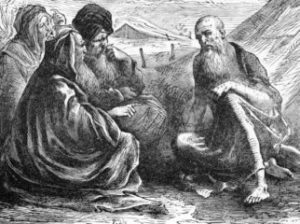Lessons from Job
This is my fourth and final post in this series addressing the topic When Evil Prospers. In this post we will discuss some of the lessons I have gleaned from the book of Job.
If you have missed the earlier posts on this topic, you can link to the beginning by clicking here.
Bad Things Sometimes Happen to Good People
 The book of Job is an amazing story of faith maturing through overwhelming trials. One of the difficulties we have with this story is the lack of definitive answers. We instinctively want to know, what did Job do to cause such tremendous catastrophe in his life?
The book of Job is an amazing story of faith maturing through overwhelming trials. One of the difficulties we have with this story is the lack of definitive answers. We instinctively want to know, what did Job do to cause such tremendous catastrophe in his life?
However, we are told at the very beginning of the book:
There was a man in the land of Uz whose name was Job; and that man was blameless, upright, fearing God and turning away from evil. (Job 1:1)
And:
The Lord said to Satan, “Have you considered My servant Job? For there is no one like him on the earth, a blameless and upright man, fearing God and turning away from evil.” (Job 1:8)
I have heard several preachers try to nail down exactly what sin Job committed. However, their explanations fall short and directly contradict the text. This is exactly what Job’s friends tried to do… help Job figure out where he sinned, so he could repent. Job resolutely defended himself and declared he had done no wrong.
In the end, God agreed with Job and rebuked his friends. So, we must put away any thoughts that Job somehow got what he deserved because of sin. God said Job was blameless and upright before Him.
I think we find this particularly troubling because the obvious implication is the same thing could happen to any of us. If Job did nothing wrong yet suffered horribly, what is to keep the same thing from happening to any of us? In our legalistic mindset, we want to find ways to ensure bad things will not happen to us or our families.
The reality is bad things can and do happen to good people. Job stands as a testament to the fact that horrible tragedy is not necessarily a sign of sinful lifestyles, nor is it a sign of God’s absence or displeasure. Job lived a righteous life. Job loved God. God loved Job. Yet, Job suffered catastrophic loss.
Trials Transform Theory into Reality
At the beginning of the book we are told Job was “blameless, upright, fearing God and turning away from evil.” This was Job’s reputation and we have no reason to doubt it. However, in the first chapter, these are only the words of a character witness with nothing solid to hang them on. Hearing someone is righteous does not carry the same weight as actually seeing them live their life with integrity.
By the end of the book, we are absolutely certain Job was “blameless, upright, fearing God and turning away from evil.” We can feel Job’s integrity in our bones, along with his sorrow, pain and numerous questions.
Job’s faith was only theory at the beginning of the story, but through trials it became reality. Faith must be tested before it is real.
In the beginning of the story, Job believed God was faithful, just, and worthy of worship. Through the trials, God confirmed all of these things to be true. In the end, Job did not believe God’s faithfulness because of what he had been told, but because of what he had experienced.
From the beginning of the story to the end, we can see Job’s faith transform. Initially, Job trusted in his own integrity to ensure no harm would come to his family. By the end of the story, Job learned to trust God’s goodness and faithfulness despite the harm that had come to himself and his family. Job learned to be honest with God in his frustration and anguish, and God praised Job’s honesty.
Satan asked to test Job. God used the test to transform Job’s theoretical faith into reality and to deepen Job’s trust in God. By the end of the story, Job did not trust God because of the physical blessings in his life. Rather he learned to trust God regardless of circumstances, because he had come to know God’s character.
God is Always in Control
When God finally responded to Job’s questions, it was with a lengthy list of what God can do. For a full four chapters, God reminds Job of His power, might, and wisdom.
No matter how horrible things may seem, no matter how confusing our circumstances, God is still all-powerful and is still in control. Although He may not seek our counsel or tell us His plans, He is still in control, and we can trust Him.
Going back to the first chapter of Job, we read:
Then Satan answered the Lord, “Does Job fear God for nothing? Have You not made a hedge about him and his house and all that he has, on every side? You have blessed the work of his hands, and his possessions have increased in the land. But put forth Your hand now and touch all that he has; he will surely curse You to Your face.” Then the Lord said to Satan, “Behold, all that he has is in your power, only do not put forth your hand on him.” So Satan departed from the presence of the Lord. (Job 1:9-12)
God had a hedge of protection around Job. Satan could not touch Job without God’s permission. Yes, bad things sometimes happen to God’s children… but not without God’s permission. God did not bring calamity upon Job… that was Satan’s work. However, Satan had to ask God’s permission and follow God’s parameters.
I find this realization simultaneously discomfiting and comforting. I’m not crazy about the realization that calamity could strike all at once for no apparent reason. However, it is extremely comforting to know God… who loves me deeply and wants nothing but the best for me… is in complete control and sets bounds on what He allows Satan to do.
Trials Teach Us to Depend on God
In the end, Job made this declaration to God:
“I know that You can do all things,
And that no purpose of Yours can be thwarted.
‘Who is this that hides counsel without knowledge?’
Therefore I have declared that which I did not understand,
Things too wonderful for me, which I did not know.”
‘Hear, now, and I will speak;
I will ask You, and You instruct me.’
I have heard of You by the hearing of the ear;
But now my eye sees You;
Therefore I retract,
And I repent in dust and ashes.”
Through his trials, Job gained a fresh perspective on how much he does not know, on how awesome God is, and on how totally reliant we are on God.
Healing Begins with Ministering to Others
When Job was at rock bottom… when he had lost his children, his wealth and his health… when his friends had all accused him of sin he wasn’t guilty of… when God had put Job in his place by reminding him how little he knew of God’s power and might… then God told Job to pray for his friends. These are the same friends who came to minister to Job in his misery, but wound up lecturing him. Job was told to pray for them.
The Lord restored the fortunes of Job when he prayed for his friends, and the Lord increased all that Job had twofold. (Job 42:10)
As Job began to minister to others out of his poverty, he began to find healing himself. I have found this to be true in my own life. Healing often begins with ministering to others.
A Higher Purpose
The book of Job opens with a mysterious scene:
Now there was a day when the sons of God came to present themselves before the Lord, and Satan also came among them. The Lord said to Satan, “From where do you come?” Then Satan answered the Lord and said, “From roaming about on the earth and walking around on it.” The Lord said to Satan, “Have you considered My servant Job? For there is no one like him on the earth, a blameless and upright man, fearing God and turning away from evil.” (Job 1:6-8)
The scene described is some sort of heavenly counsel with God presiding over the angels, and Satan shows up.
What is Satan doing in a heavenly counsel? Why is he allowed to stay? Why did God call his attention to Job? Why did God permit Satan to test Job?
No clear answers are provided. No doubt, one major reason was for Job’s own benefit. As previously discussed, the trials transformed Job’s faith and deepened Job’s relationship with God.
Yet, there seems to be something more going on here. The narrator presents this heavenly scene as though it is a common occurrence… as though Satan often enters God’s presence and frequently converses with God about the hearts of humans.
Although the Bible provides no definitive answers, I think it is worth speculating to see what we can glean.
Revelation gives us a little more insight:
And the great dragon was thrown down, the serpent of old who is called the devil and Satan, who deceives the whole world; he was thrown down to the earth, and his angels were thrown down with him. Then I heard a loud voice in heaven, saying, “Now the salvation, and the power, and the kingdom of our God and the authority of His Christ have come, for the accuser of our brethren has been thrown down, he who accuses them before our God day and night. And they overcame him because of the blood of the Lamb and because of the word of their testimony, and they did not love their life even when faced with death. (Revelation 12:9-11)
Satan is described as “the accuser of our brethren… who accuses them before our God day and night.”
This sounds like a court room scene… a King’s court where people come for justice and the King dispenses justice in His wisdom. Satan, the accuser, is there bringing his petitions before God. Jesus, our advocate is also there:
My little children, I am writing these things to you so that you may not sin. And if anyone sins, we have an Advocate with the Father, Jesus Christ the righteous; and He Himself is the propitiation for our sins; and not for ours only, but also for those of the whole world. (1 John 2:1)
Note that Satan is our accuser and God is our defender. That is good news! Too often, God’s justice is viewed as His raging against our sin. However, the Bible presents God’s justice as being exercised in our defense against Satan, the accuser.
So, what is Satan accusing us of and why? Based on the passage in 1 John, Satan is accusing us of sin. But why should he care if we sin? Isn’t Satan in the business of tempting us to sin? Why would our sin be the basis for Satan to file a petition against us?
Besides, as John stated, Jesus, “Himself is the propitiation for our sins; and not for ours only, but also for those of the whole world.” So, if our sins have already been dealt with, why is Satan bothering to continually accuse us? What does he hope to accomplish?
Jesus has already redeemed us from Adam’s covenant with sin and death. He has already made propitiation for our sins. He has already cut a new covenant with the Father on our behalf. All that remains is for each of us to add our yes and amen to the work Jesus has already accomplished, and to walk in that new covenant as children of the living God, through the transforming power of the Holy Spirit.
From Adam to Jesus, Satan had a lawful claim over the souls of mankind, as well as authority over the earth. Jesus has already defeated Satan and redeemed mankind. Soon, Jesus will come again to reclaim the earth.
Satan is now playing the only card he has left to play… our free will.
God uses covenant to enrich and bless. Satan uses covenant to enslave and abuse. God does not hold us in covenant against our wills. Satan does.
Satan continually accuses us of sin, before God, to try to make the case that we are rejecting our covenant with God and embracing a covenant with Satan. Just as he did with Adam and Eve at the beginning, Satan is using our free wills against us to try to entrap us, in order to retain control over our souls as well as over the earth. For His children, Jesus continually advocates.
So, what is our role in this court?
And they overcame him because of the blood of the Lamb and because of the word of their testimony, and they did not love their life even when faced with death. (Revelation 12:11)
This verse just amazes me! I know we are saved through the blood of Jesus Christ. I know our salvation is “by grace, through faith, not of works.” Yet, this passage adds something. We get to participate in our own salvation… in Satan’s final defeat.
As that court scene is played out, Satan is defeated not only by the blood of Christ, but also by the word of our testimony and by our faith in action. We are called to give testimony and our testimony aids in defeating our accuser.
Satan comes before the throne of God with his list of grievances… the rampant evil and wickedness found in his “wandering to and fro upon the earth”… presented as evidence against the human race… proof that our hearts truly belong to him and not to God… proof that we are more his children than God’s… proof that we don’t really want to be in covenant with God at all.
God responds, “Have you considered My servant Job? For there is no one like him on the earth, a blameless and upright man, fearing God and turning away from evil.”
In that moment, Job’s faithfulness is God’s evidence presented to counter Satan’s accusations against the human race. From this perspective, Job’s suffering serves a higher purpose in the final battle against Satan.
Yes, God is the final judge. However, as a just judge, He considers all the evidence and allows all arguments to be presented. In the final judgment, all will know God is just.
Could it be that I have, in some small way, been a part of this epoch court battle? Could it be that God at some point has called me to the witness stand, “Have you considered my servant Joe?”
I hope so! I hope my testimony has been found worthy of presenting as evidence. I hope I am a credible witness. I hope I have played my small part in defeating Satan, our accuser.
No wonder the apostles rejoiced that they had been considered worthy to suffer for Christ!



 For me, the faith crises occurred as an abusive marriage spiraled toward divorce, following many years of praying and believing God would somehow heal that relationship. The crush of failure… coupled with the sorrow of relational loss… the pain of ongoing emotional abuse… the firm (though incorrect) belief that divorce was never the best choice… and the apparent lack of response to years of fervent prayers spoken from a heart of deep conviction and faith… led to this dark place of concluding God must not really love me.
For me, the faith crises occurred as an abusive marriage spiraled toward divorce, following many years of praying and believing God would somehow heal that relationship. The crush of failure… coupled with the sorrow of relational loss… the pain of ongoing emotional abuse… the firm (though incorrect) belief that divorce was never the best choice… and the apparent lack of response to years of fervent prayers spoken from a heart of deep conviction and faith… led to this dark place of concluding God must not really love me.